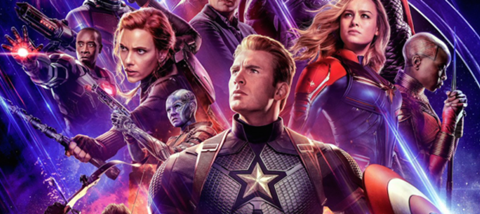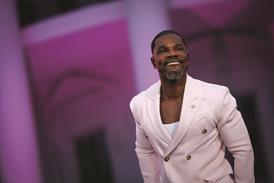As the phenomenally popular Marvel film franchise continues this month with the release of Avengers: Endgame, film critic Nathanael Smith explains why he believes the franchise stands for very little and resists substance at almost every opportunity

At the end of April, Avengers: Endgame will be released into cinemas, destroying all box office competition with a click of its fingers. Forget trying to see anything else at the multiplex, Captain America, Iron Man and co will be filling every screen and raking in all of the ticket money in the country. There’s a strong chance that it’ll be the most financially successful film of all time.
Of course, its certain success doesn’t exist in isolation; Marvel has been building to this moment since Iron Man was released in 2008. There are now 21 films in the Marvel Cinematic Universe (MCU), with Captain Marvel the latest entry (and the first to be led by a female superhero). Marvel films, which feature a litany of superheroes, including Spiderman, Thor and Ant Man, have so far raked in over $17.5bn at the box office. Audiences are flocking to these movies en masse, lapping up every frame that the studio has released and buying all the merchandise, too.
The films have also largely resisted any kind of rigorous analysis. Ask anyone what they like about the franchise and they’ll celebrate the action and the fun of seeing their favourite heroes wallop one another. It’s ultimate popcorn entertainment – some audience members might even tell a critic like me to “switch your brain off”. Yet all films have something to say and we dismiss the most mass-consumed franchise of all time at our peril. Your kids are watching these films, your friends are watching these films. In fact, if you were born after 1960, you’re a statistical anomaly if you haven’t seen one of these expensive behemoths.
So what does it say about our culture that we’re flocking to see these movies so eagerly? And, in turn, what are these films saying to our culture? Christians should be switched on to society’s loudest voices, and not just so we can have superhero-themed events at our church summer camps. If we want to speak into the idols of our day, or appeal to the desires of a generation, understanding the culture they consume is one important step to comprehending our world and its preoccupations.
Familiarity sells
One of the main reasons that people turn time and again to Marvel films is the same reason people stick with radio stations, food chains and Church denominations – they know exactly what they’re going to get. I spoke to the film critic for the National Catholic Register, Steven D Greydanus, about the worldwide appeal of these gigantic films and he compared them to fast food: “Marvel has achieved its unparalleled success in part by following the same approach as McDonald’s: by offering a reliable product with as little risk as possible for either the producers or the consumers. The goal of each Marvel
movie isn’t to send viewers out of theatres thrilled and sated: it’s to send them out looking forward to the next Marvel movie. After the origin stories, few, if any of these movies, offer a really satisfying experience. Often enough, later movies undermine and contradict the earlier ones – but who cares? There’s always the next one!”
The world is complicated and confusing, but marvel films are not
The Marvel system feeds into our consumerist culture. They release the next ‘must-see’ film faster than Apple is churning out iPhone models that you ‘absolutely have to have’.
Marvel does this by guaranteeing a certain standard to its end product and throwing millions into a marketing and hype campaign. This is the company who described the release of Avengers: Infinity War as “the most ambitious crossover event in history”. Internet users quickly poured ridicule on the hyperbolic statement, and suggested other supposedly more ambitious combinations, including Heinz’s Mayochup – a combination of mayonnaise and ketchup.
There’s something unnerving about films that, on the surface, are telling different stories yet all feel the same. They all follow familiar structures, with messy final acts that involve a lot of muscly people smashing into rocks, trees and buildings. They look similar too, with a glossy sheen covering every new film, even if they have become noticeably more colourful in recent iterations. That familiarity is what’s driving people to the cinema – they expect a tale that’s told with pace, top-of-the-range visual effects and a story that follows a formula.
Crash, bang, joke, wallop
Formula isn’t necessarily a bad thing, whether it’s a recipe for romcoms, westerns or superhero smash-ups. It’s what you do with the formula that counts and often Marvel avoids playing around with the formula in favour of a predictably charming, breezy and explosive entry into their canon. In the MCU, emotions are cheaply won and quickly forgotten and it’s all about giving you a good time for 2.5 hours. Distraction is everything.
There’s a distinct tone to every Marvel film, which involves punctuating the carnage and the plotting with zingers and jokes. Thor hits an alien. One-liner. Cap throws his shield. One-liner. And repeat. It reached the point of silliness in Avengers: Infinity War, when the fate of the entire universe was at stake and people were still cracking wise while destroying a faceless horde of alien goons. It serves to keep things feeling fresh and fun, but also detracts from emotional investment in the action or a sense of the characters being in danger. Because, well, they’re not.
Marvel has followed the same approach as McDonald’s: by offering a reliable product with as little risk as possible
One of the most fascinating ways that Marvel seeks to provide premium distraction is by making films where death never matters. Loki, Iron Man and Groot are just a few of the characters who have made noble sacrifices without having to actually stay dead. Part of this is a financial decision – you can’t kill off a character that could earn you an extra billion dollars – but it also contributes to a franchise where the stakes of the plot are high, but never for long. Again, Infinity War was the logical endpoint of this, concluding with half the universe being culled by a brutally utilitarian purple guy. Only, the characters they killed off, including Spider-Man and Black Panther, already have their sequels announced. So their deaths really don’t matter because they won’t stay dead. It’s a cheap route to emotional impact and, ultimately, victory without any cost.
The modern myths
Superheroes first emerged in popular culture in the mid-to-late 1930s, when the Great Depression and the rise of fascism saw people turning to super-heroics as a blissful escape from grim reality. “In the 1950s, Superman and Batman were upstanding, clean-cut role models who embodied a putative cultural consensus, real or illusory, about civic virtue and responsibility,” says Greydanus. “As that consensus unambiguously broke down in subsequent decades, our heroes became more complex and ambiguous.”
The 2008 crash, 9/11, the rise of populist nationalism and bitter political divides have coincided with a broad dechristianisation of the West. The world is complicated and confusing, but Marvel films are not, so we’re forking out our sterling to escape, to be distracted and to find comfort in familiar characters achieving incredible feats.
But society doesn’t know what it wants from its mythic heroes now. Entire nations are divided by what the concept of “good vs evil” actually means, so making a statement (or even raising a question) about morality is difficult without alienating others who might disagree. Who can say what the Avengers actually stand for beyond people not dying? It’s a disparate group of heroes with no centralised motivation or ethos, just a bunch of exceptionally powerful, mostly immortal, humans fighting faceless armies to represent some poorly defined form of evil. Their latest villain, Thanos, is too powerful to represent anything specific, yet evil enough to fill in for the general anxiety that’s permeating our society. It’s a battle of good vs evil where neither side is well-defined but you still know who you want to win.
The result, I’d argue, is a franchise that stands for very little and resists substance at almost every opportunity. Occasionally this can lead to something riotously entertaining, with all of the power and technology Hollywood can throw at big-screen entertainment. Yet just as much of the result is storytelling that feels disposable, that doesn’t want to provoke or confuse because it could jeopardise the bottom line.
So we have films that – with the shining exception of Black Panther – are largely nuance-free, which makes sense for an era where social media is causing the death of nuance across theological and political discourse. We see vague aspirations of what the culture wants – community, family, companionship – with every form of hero possible, from warrior kings to actual gods. It all coalesces into something that feels big, noisy and temporarily exciting, but that is desperately in need of some character development and emotional depth.
These things shall pass. Every few decades, Hollywood finds a new genre to pursue for a time. In the past, it has been westerns, sci-fis, historical epics and more. It says something about our era that we’re all rushing to the cinemas to see good defeating evil, at no cost, and our heroes are people with little semblance of humanity in their powers or personalities. We want big fights punctuated by zippy one-liners and funny jokes. Marvel has created a franchise that’s “too big to fail”. It’s mass-marketed, mass-released, mega-budget filmmaking for the widest possible audience. Maybe there’s something to be said for a franchise that can please so many people, but I feel that its pleasure is too fleeting.
CS Lewis once said of humanity that “we are far too easily pleased”. He was talking about our pursuit of sin when we’ve been offered the riches of heaven, but perhaps it speaks, also, to our need for safe, palatable entertainment.
Holding out for a hero
It is, perhaps, trite to draw connections between the gospel and any kind of Marvel character. Jesus is a good deal more complex and his heroism is far grittier than Captain America or Ant-Man. I think it’s more salient to learn from the MCU that society is looking for some kind of escape and hope as they increasingly feel helpless. We live in a time of fear, driven by uncertain geopolitics, escalating climate change, increased mental health problems and a cultural understanding of morality that shifts like the sands of a desert.
These stories offer some of the best entertainment that Hollywood can buy and they conveniently come without any sort of provocation or difficult ideas. People are drawn to stories and Marvel have worked out a way to monetise that successfully. Evangelists should, first and foremost, be storytellers, especially to this story-mad generation. We live in an age where the person with the most compelling story is the one that’s deemed to be true.
Christians have a better story, one that offers more hope and satisfaction than any Avengers film. The challenge, however, is that it doesn’t offer escape in the same way. The gospel places us in the world, not escaping it, landing us right in the mess we’ve made. It also empowers us to be a part of the solution. We’re actually called to be nuanced in a society that rejects it, to find empathy for people who are a whole lot more complex than any cinematic character.
Escapism is one of the oldest forms of entertainment, but it’s a deceptive friend; the hope it offers is fleeting. Christians provide something a lot more robust, with a story that’s far richer and more satisfying than mere escape. There’s no denying the technical wizardry of Marvel, but we should recognise in its success a society that’s desperately seeking some kind of reprieve from a world they no longer understand. The gospel actually helps us make sense of the world through telling the most compelling story. It’s one in which death is real, but has been defeated. Where good and evil exist, but they have a clearly defined shape and the victory has already been won. Best of all, it’s not mindless distraction or flashy escapism. It’s the truth.








































No comments yet